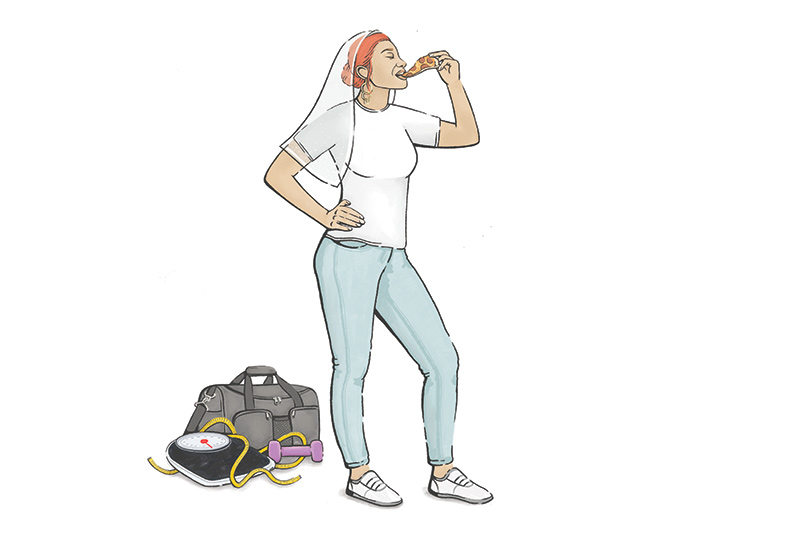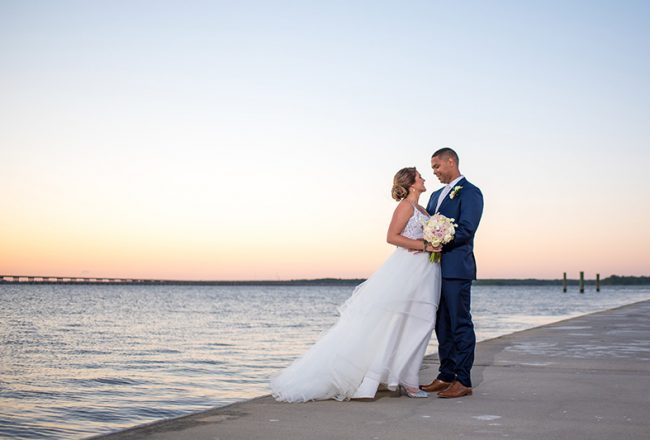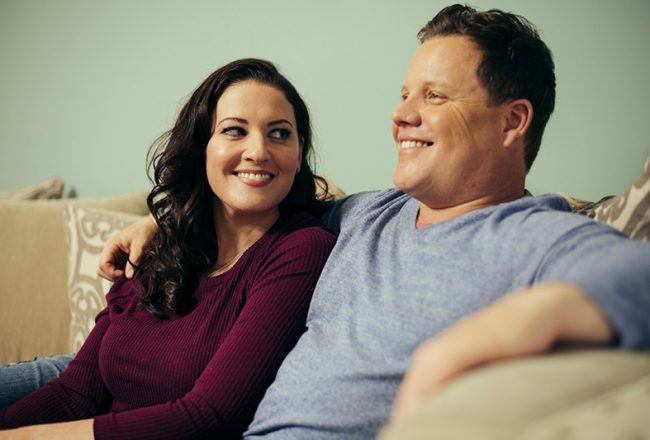Illustration by Abby Musial
A local expert helps brides avoid unhealthy eating and exercise habits by promoting a wellness approach to wedding planning.
Words by Mona de Crinis
Your wedding is just around the corner. You’ve dreamed of this moment since you were a little girl, walking down the aisle in a form-fitting flowing white dress. You just need to lose those pesky 5 pounds, flatten the tummy a little and tone up flabby arms.
You hop to the internet and punch “bridal boot camps” into your search engine. You’ve heard other women tittering about such things while shopping for bridal gowns, and you’ve even tuned in to a few episodes of Bulging Brides—a Canadian reality series binge-watched by one of your bridesmaids. You know if you don’t do something soon, you’ll be fat-shamed forever on social media as your less-than-perfect body puffs out beyond the constraints of the one-size-too-small dress you purchased as motivation.
Stop right there, says Robia Smith-Herman, a licensed clinical social worker who created “The Brides’ Guide to Taking Care of Yourself During Wedding Planning” to help women avoid potential pitfalls that could lead to disordered eating.
The National Institute of Mental Health reveals that one in five women suffers from an eating disorder such as anorexia nervosa, bulimia or binge eating. And contrary to a commonly held belief among the general public, it’s not a disorder reserved only for young girls. A growing number of women in their 30s, 40s and even 50s are included in NIMH’s research, thereby debunking the myth that it’s a teenage issue that can resolve itself with age.
In a 2015 article published in 302Health, Linda J. Lang, M.D., chair of the department of psychiatry and behavioral health at ChristianaCare Health System in Wilmington, Delaware, acknowledged that while eating disorders generally start in adolescence, older women are still plagued by disordered eating that took root at an earlier age. “The body becomes distorted, and that can trigger a feeling of being out of control,” Lang observed.
“Skipping meals or using meal replacement items, eliminating food groups, detox teas or laxatives, and exercising excessively is not safe. This is especially relevant when it comes time to ‘say yes to the dress.’” —Robia Smith-Herman
As a team leader and student supervisor at The Renfrew Center, a residential eating disorder facility with 19 locations across the country and a pioneer as the nation’s first facility of its kind, Smith-Herman has seen how stress combined with the pressure to conform to often unrealistic standards of beauty can trigger unhealthy behaviors. And as a recent newlywed, she’s experienced first-hand the avalanche of advertisements promising to fast-track brides-to-be to a better body.
“When I was planning my wedding, there was a lot of Googling and looking at wedding websites and, as a result, I started getting targeted advertisements across the board,” she recalls. “Some of those advertisements were promoting meal kits to help you lose weight for your big day or [weeks]long programs featuring daily workout regimens and suggested food plans. The issue with most of these is that they’re asking you to radically restrict your caloric intake and increase your activity, which can have negative future repercussions.”
As for “bridal boot camps,” Smith-Herman warns that over-exercising—the primary thrust of these programs—can become a compensatory method of purging the body of perceived unwanted calories.
“That strict exercise regimen can turn into a pattern that you’re unable to break,” she says, adding that Renfrew Center dieticians recommend that women regularly engage in movement appropriate to an individual’s needs and physical makeup—essentially allowing your body to dictate how much and how often you exercise. “These boot camps are the exact opposite of this,” she says.
Smith-Herman cites an alarming statistic noted by the center’s dieticians: Ninety-five percent of people who diet gain the weight back, if not more, in five years.
“Your body doesn’t want you to be under its natural weight,” she explains. “These diets that ask you to curb intake and remove food groups might help you lose weight in the short-term, but in the long-term, they can lead to dangerous cycles of yo-yo dieting and disordered eating.
“I’ve worked with women who got engaged and went on a wedding diet, then six months or a year into their marriage realized they were still on the wedding diet and it was causing them stress—and distress—to stop.”

Kick wedding-body bootcamps to the curb and adopt a healthier lifestyle that includes self-care and moderate exercise through activities you enjoy.
In analyzing cases brought to The Renfrew Center, Smith-Herman believes that the uptick in women with eating disorders has a direct correlation to a preoccupation with physical appearance fueled by social media.
A few years ago, platforms like Instagram and Twitter were not what they are today, she says. “They’ve definitely shifted the focus to a broader audience.”
The desire to have that killer bride body is amplified tenfold when Snapchat and Facebook are invited to the wedding. The voracious need for approval from these phantasmal guests spurs some women to self-injurious actions as they turn to social media for validation calculated by the number of likes and flattering comments scrolling beneath their posted wedding photos.
In her “Brides’ Guide,” Smith-Herman identifies red flags to watch for in the months leading up to your wedding day, such as a growing preoccupation with fad wedding diets, bridal juice cleanses, boot camps or anything else that can promote disordered eating.
“Skipping meals or using meal replacement items, eliminating food groups, detox teas or laxatives, and exercising excessively is not safe,” she says. “This is especially relevant when it comes time to ‘say yes to the dress.’ Your significant other loves you for you, so do not deviate significantly from your current dress size.”
Instead, Smith-Herman suggests practicing self-acceptance and self-love by eating balanced and varied meals, and surrounding yourself with close friends and family whose only motivation is to provide support.
“Be cautious of those who are just trying to sell you something, rather than those who genuinely want to see you happy on one of the most important days in your relationship,” she advises.
Taking time for yourself and your partner is also a critical component of self-care during the heightened stress of wedding planning. Smith-Herman offers the following: A good rule of thumb is for every three wedding activities you do, have one activity that has nothing to do with the wedding that focuses on taking care of yourself or spending time with your significant other.
“Yes, your wedding day is about you and your relationship and family and friends, but it’s also a day when you should be focused on being fully present and mindful as opposed to being hyper-focused on your appearance,” she explains. “As a result, you really shouldn’t have to change anything. Keep eating the way that you’re eating. Keep your activity level the same as it’s always been, because that’s more important than posting a picture online. Your day will be special in and of itself, simply because of what it is.”
A healthy, self-nurturing lifestyle before, during and after your big day is rooted in learning to love yourself just as you are, Smith-Herman suggests. “Being happy shouldn’t have to come from looking a specific way.”
Need help?
For brides-to-be who feel themselves spiraling into an obsessive need to mold themselves into a shape defined by popular culture and social media rather than their bodies’ natural proclivity, The Renfrew Center website contains valuable information on available services designed to steer them back to a healthier track. The Renfrew Center offers multiple levels of care, including evening outpatient sessions and support groups for working women, telehealth options for rural areas, and residential and day treatment. For more information, call 800-736-3739 (800-RENFREW) or visit renfrewcenter.com.





No Comment